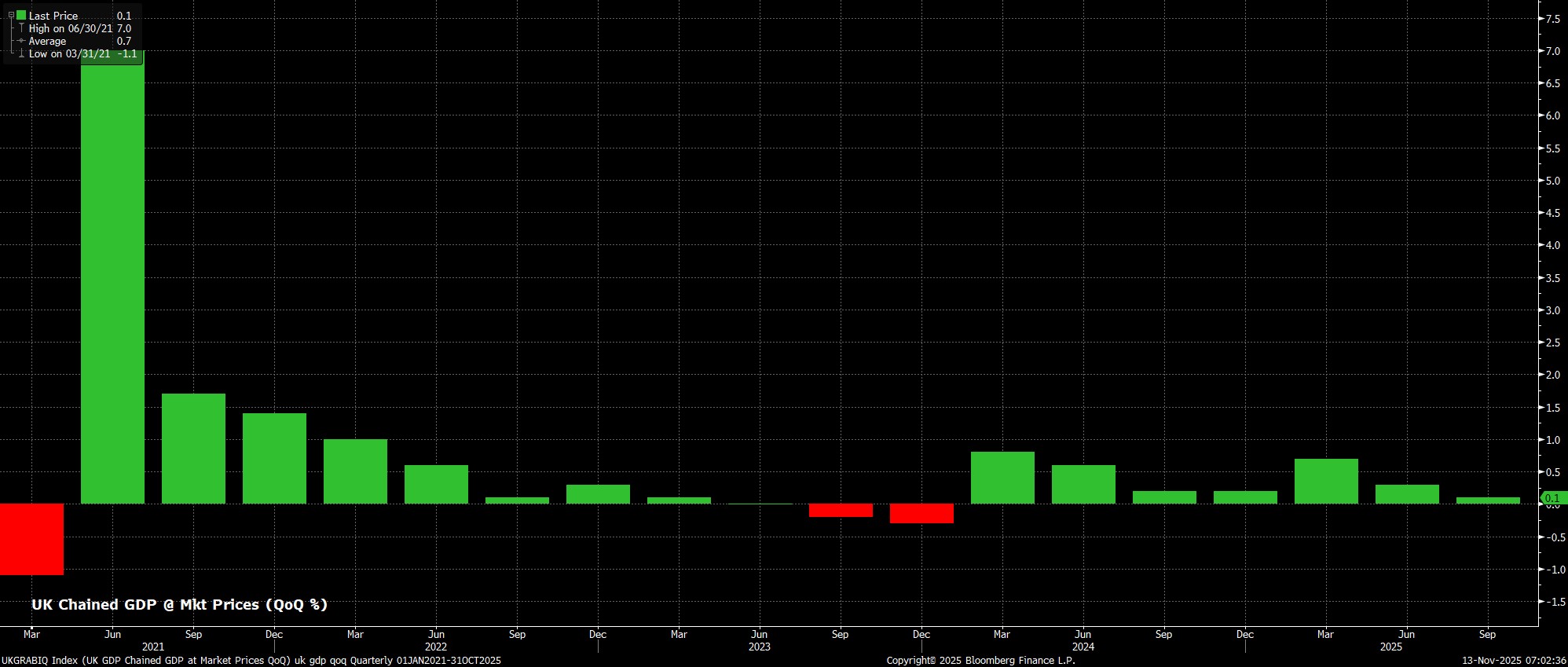CFDs are complex instruments and come with a high risk of losing money rapidly due to leverage. 80% of retail investor accounts lose money when trading CFDs with this provider. You should consider whether you understand how CFDs work and whether you can afford to take the high risk of losing your money.
- English
- 简体中文
- 繁体中文
- ไทย
- Tiếng Việt
- Español
- Português
- لغة عربية
Q3 25 UK GDP: A Dismal Quarter With Worse Still To Come

In the third quarter, the economy grew by a meagre 0.1% QoQ, below both market expectations, and the BoE's forecast, of 0.2% growth, which, in turn, makes it the fourth quarter in the last five where the economy has failed to grow by more than 0.3%, with UK Plc having, for all intents and purposes, flat-lined over the last fifteen months or so.
In terms of the components of the release, growth in the third quarter was driven primarily by the services and construction sectors, with manufacturing acting as a significant drag on the economy, where output fell by 0.5% QoQ. Once again, however, overall business investment fell during the quarter, by 0.3% QoQ, a dismal sign indicating a severe lack of confidence in the outlook for the economy moving forwards.

Looking ahead, risks to growth tilt rather obviously to the downside into year-end. Not only has the 12-week long Budget run-up, and associated rumour mill going into overdrive, created a considerable degree of uncertainty which will act as a stiff headwind through the autumn months, the post-Budget reality of a substantially tighter fiscal policy is likely to pose a chunky headwind too, most notably to consumption growth, if what seems a near-certain rise in the basic rate of income tax does indeed prove to be delivered on 26th November.
For the Bank of England, policymakers are unlikely to place too much weight on today's data, which is of course rather stale and backwards-looking. That said, with the MPC believing that the inflation peak is now in, and with slack emerging in the labour market at a worrying rate, a 25bp Bank Rate cut at the December meeting now seems to be a done deal. That, hence, is now the base case, barring any surprises in the October or November inflation reports, with such a cut likely to be followed by another at the next meeting in February, as the economy makes further disinflationary progress, allowing policymakers' to pivot somewhat more dovishly, in an aim to support an ailing UK economy.
The material provided here has not been prepared in accordance with legal requirements designed to promote the independence of investment research and as such is considered to be a marketing communication. Whilst it is not subject to any prohibition on dealing ahead of the dissemination of investment research we will not seek to take any advantage before providing it to our clients. Pepperstone doesn’t represent that the material provided here is accurate, current or complete, and therefore shouldn’t be relied upon as such. The information, whether from a third party or not, isn’t to be considered as a recommendation; or an offer to buy or sell; or the solicitation of an offer to buy or sell any security, financial product or instrument; or to participate in any particular trading strategy. It does not take into account readers’ financial situation or investment objectives. We advise any readers of this content to seek their own advice. Without the approval of Pepperstone, reproduction or redistribution of this information isn’t permitted.